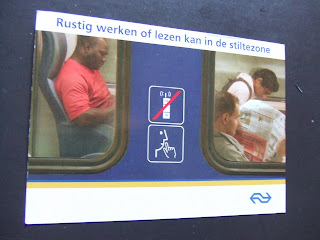

“It was time for us to not see each other for a while; we really needed a break."
The young woman across the aisle was clutching her cell phone, staring out of the train window as she conversed. The car was fairly quiet and all passengers could follow her side of the conversation.
“We needed to take some distance.” That sounds like private information to me, and, if possible, I would want to avoid sharing such personal details with strangers. This is an old saw-horse for non-natives in the Netherlands: we converse more readily than the natives with strangers in public spaces, but we prefer to keep details of our private lives out of those public encounters.
The young woman across the aisle was clutching her cell phone, staring out of the train window as she conversed. The car was fairly quiet and all passengers could follow her side of the conversation.
“We needed to take some distance.” That sounds like private information to me, and, if possible, I would want to avoid sharing such personal details with strangers. This is an old saw-horse for non-natives in the Netherlands: we converse more readily than the natives with strangers in public spaces, but we prefer to keep details of our private lives out of those public encounters.
Having said that, there is visible evolution underway; conversational boundaries appear less daunting. Whether or not this is happening independently of the ever-increasing vociferousness of the xenophobic right-wing (on occasion this can trigger responses such as “if you don’t like that in NL, just look at your own country” or “you can leave if you don’t like it” – before things get that far, I try to say: most countries seem to have one. Both countries which continue to supply me with passports certainly do), I can’t say.
More good news: xenophobes from England travelled to Amsterdam this weekend to join their Dutch comrades in an anti-foreigner demonstration, which basically fizzled out due to poor attendance. The righties were indignant about being forced to hold their rally far from the city center. Police kept the xeno’s and rival groups at a safe distance from one another, and I believe the Brits even got a free ride back to the airport in police vans. With so much hostile debate - on the streets and in parliament, for that matter – one doesn’t necessarily want to spend a train trip as witness to the hashing out of a private relationship, no matter how skilled the speaker may be. By the end of the young woman’s conversation with her estranged (business?) partner, she was chuckling and suggesting time and place for coffee.
For those wanting to avoid uninvited input of this nature, the Dutch railway system offers an alternative: many trains include a ‘Silence Car,’ a compartment where conversation, use of telephones and over-modulation of audio devices are discouraged. I respect the zone – not even my emery board comes into view. ‘Silence’ (and the Dutch equivalent ‘Stilte’) appears on the windows for those seated inside. The phone and conversation ban is also introduced with small visual aids on the walls. The challenge can be to identify the car before boarding, by catching a glimpse of the sign as your train speeds up to the platform before screeching to a halt. I scan the cars with some anxiety as they pass; my successes in entering Silence Cars have been purely coincidental.
Several recent occasions come to mind, all of them on trains passing through Amsterdam on their way to Schiphol Airport. Natives who have unwittingly taken seats in the quiet zone can generally be cajoled into a reflective state or at least into reducing their conversation to a whisper. Some collapse in giggles when asked by fellow passengers to respect the rules; others demonstrate belligerence – all of which contributes to even more noise.
A good number of the passengers are foreign visitors on their way to catch a flight home at the end of a busy working day or week. Once on the train, they are experiencing their first moments of leisure, remembering local hosts fondly. They make phone calls to offer thanks and to finalize agreements; they ask people to look out for a vest or scarf carelessly left behind. A Swedish businessman had evidently been working hard: he was slap-happy with laughter as he bid his hosts farewell. A Greek salesman ran a last inventory check, commenting on items held up from the open briefcase on his lap. A man speaking a minority language from the Surinamese interior was harangued into silence by a businesswoman (with whom I shared a moment of significant, simultaneous eyebrow-raising) speaking Sranantongo, the unifying language of Suriname, along with Dutch, of course. A group of French-speaking women introduced great mirth and good cheer into the wordless zone with chatter and laughter (please consult video fragment below). A fellow passenger, again across the aisle, explained (breaking off her glare at the rather derelict figure, with a bandaged hand and unkempt hair, hunched sideways in the bench across from mine in utter oblivion as he emitted a loud, grating snore) - she explained in a delightfully heavy Amsterdam inner-city accent why this was okay:
“They’re foreigners, they don’t know the rules.” I was grateful for this unexpected encounter with a glimmer of tolerance in the zone where we were meant to have immunity from exposure to any and all contrasting views.




No comments:
Post a Comment